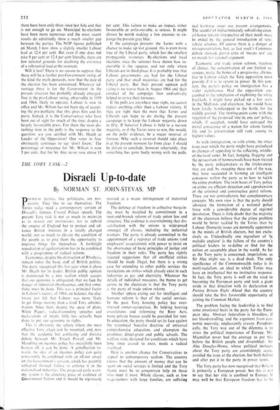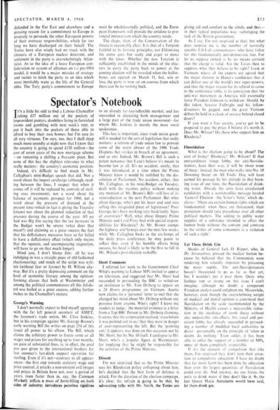THE TORY TASK - 2 Disraeli Up-to-date
By NORMAN ST. JOHN-STEVAS, MP
pou rricAL parties. like politicians, are nar- cissists. They like to see themselves. The Tories today need a contemporary version of Disraeli's famous Crystal Palace speech. The present Tory task is not so much to maintain as to restore our institutions: not to uphold the empire of England but to protect and ad- vance British interests in a totally changed world: not so much to elevate the condition of the people as to give them the opportunity to improve things for themselves. A forthright repudiation of egalitarianism has to be combined with a programme of radical reform.
Economics, despite the distraction of Rhodesia, remain today the basic stuff of British politics. The party recognised this last year when it chose Mr. Heath for its leader. British public opinion is dominated by a new realism which accepts that our economy is antiquated, that we face the danger of industrial obsolescence, and that some- thing must be done. This w as a principal factor in Labour's victory of 1964; on balance, the elec- torate just felt that Labour was more likely to get things moving than a tired Tory adminis- tration. Since then, despite the spate of plans. White Papers, radical-sounding speeches and declarations of intent, little has actually been done to put our economy to rights.
This is obviously the sphere where the most effective Tory attack can be mounted, and, now that the academic but confusing and divisive debate between Mr. Enoch Powell and Mr. Maudling on incomes policy has mercifully been broken off, it can be done. A genuflection to- ward; the idea of an incomes policy can quite consistently be combined with an all-out attack on the Gosernment's version, which has patently collapsed through failure to enforce it in the nationalised industries. The proposed early warn- ing system is the clinching piece of evidence of government failure and it should be vigorously resisted as a major infringement of industrial freedom.
The defence of freedom in collective bargain- ing must be matched by commitment to a root-and-branch reform of trade union law and structure. The evidence is overwhelming that dis- satisfaction with the unions is widespread amongst all classes, including the industrial workers. The party is already committed to the appointment of a registrar of trade unions (and employers' associations), with power to insist on the observance of basic principles of justice and freedom in their rules. The party has rightly rejected suggestions that all unofficial strikes should be made illegal, but there is a strong case for extending to other public services the restrictions on strikes which already exist in such industries as gas and electricity. Whatever the details of individual measures, the theme to get across to the electorate is that the Tory party is the party of trade union reform.
Another sphere crying out for intelligent and humane reform is that of the social services. In the past, Tory housing policy has over- stressed owner-occupation. By helping housing associations and reforming the Rent Acts, more private houses could be provided for rent. In education, the party should set its face against the tyrannical Socialist doctrine of universal comprehensive education, and champion the grammar, direct-grant and public schools. The welfare state, designed for conditions which have long since ceased to exist, needs a radical overhaul.
Here is another chance for Conservatives to appeal to contemporary realism. The country knows that the amount of money that can be spent on social services is limited and the Tory theme must be to concentrate help on those who need it most. Whole classes, such as low sage-earners with large families, are suffering
real hardsnsp under ow present arrangements. The scandal of indiscriminately subsidising coun- cil-house tenants irrespective of their needs must be ended by the general introduction of rent. rebate schemes. Of course there is a danger of misrepresentation, but, as last week's Commons debate showed. parrot cries of 'means test' are no match for rational argument.
Economic and trade union reform, freedom of choice, the concentration of our limited re- sources. make the bones of a progressive alterna- tive to Labour 4‘. hich the Tory opposition must provide if it is to return to power. In this con- text, the party's policy on immigration has a wider significance. Had the opposition suc- cumbed to the temptation of exploiting the white backlash, it might have picked up a few seats in the Midlands and elsewhere, but would have been fatally handicapped in the battle for the middle ground. The turning-point came with the rejection of the proposed 'one in, one out' policy. which, if accepted, would have outraged the moral conscience of a nation for whom family life and its preservation still rank among its highest values.
As with immigration, so with crime, the other issue over which the party might have prejudiced its chances of appealing to the reflecting, middle- of-the-road voter. In fact, hanging, flogging and the persecution of homosexuals have been treated by the party policymakers as the irrelevancies they are and, by sweeping these out of the way, they have succeeded in forming an intelligent consensus within the party as to how to tackle the crime problem. The twin bases of Tory policy on crime are efficient detection and apprehension of the criminal and constructive penal reform. These are not contradictory but complementary concepts. My own view is that the party should advocate the formation of a national police force with a considerable degree of regional devolution. There is little doubt that the majority of the electorate believe that the crime problem would be better tackled by the Tories than by Labour. Domestic issues are normally uppermost in the minds of British electors, but not exclu- sively so. Undoubtedly one ingredient of `la maladie anglaise' is the failure of the country's political leaders to re-define or find for the nation an acceptable place in the world. As far as the Tory party is concerned, imperialism, as Sir Alec might say, is a dead duck. The only significance of the Commonwealth today is its multi-racialism, an ideal to which Tories may have an intellectual but no instinctive response. In fact, the Tory party is well on the road to becoming the European party and took a giant stride in that direction with its declaration in Putting Britain Right Ahead that the country should take the first favourable opportunity of joining the Common Market.
The problem facing the leadership is to find some emotional basis in the party for the Euro- pean idea. Abstract federalism is bloodless, if not blood-curdling, and the argument from eco- nomic necessity, unpleasantly craven. Paradoxi- cally, the Tory way out of the dilemma is to stress the political importance of Europe. Mr. Macmillan never had the courage to put this before the British people and dissembled : Sir Alec Douglas-Home, whose political instincts about the Tory party are astonishingly acute, avoided the issue at the election, but both before and after put it to the party in power terms.
The Tory party has now recognised that Britain is primarily a European power, but this is not to say that her role is confined to Europe. It may well be that European freedom has to be defended in the Far East and elsewhere and a pressing reason for a commitment to Europe is precisely to persuade the other European powers of their overseas responsibilities, which for too long we have discharged on their behalf. The Tories have also wisely had no truck with the chimera of a European nuclear deterrent, and sentiment in the party is overwhelmingly Atlan- ticist. As to the idea of a loose European con- federation or system of alliances on tsz pre-1914 model, it would be a major mistake of strategy and tactics to hitch the party to an idea which must inevitably wane as the life of the General ebbs. The Tory party's commitment to Europe must be wholeheartedly political, and the Euro- pean framework will provide the antidote to pro- vincial introversion which the country needs.
The shape, then, of the Conservatism of the future is reasonably clear. It is that of a Toryism faithful to its historic principles, not Eldonising the status quo, but ready and eager to move with the times. Whether the new Toryism is sufficiently established in the minds of the elec- tors to carry the party back to power at the coming election will be revealed when the ballot- boxes are opened on March 31, but, win or lose, the party is now set on courses from which there can be no turning back.



































 Previous page
Previous page